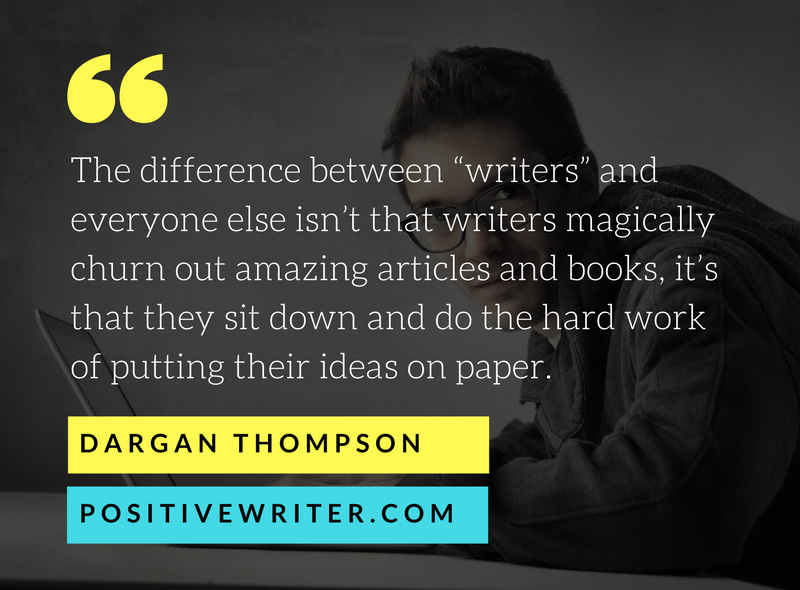Note: This is a guest post by Dargan Thompson, a freelance writer, editor and writing consultant who loves helping writers shape their words, find their voice and focus their message. Find her online at her website or on Twitter @darganthompson.

We had reached the inevitable “So, what do you do?” stage of small talk at a mutual friend’s party, and my new acquaintance was describing her job managing web content for a local nonprofit.
“I do a good bit of writing,” she said, “but I’m not sure I can really call myself a ‘writer.’”
I grinned, because the qualification sounded familiar. In the internet era, there are more people putting their words into the world than ever, and yet, many people who write feel hesitant to adopt the title of “writer.” Even getting published doesn’t necessarily cure the imposter syndrome.
I know the feeling well. Even after getting a degree in journalism, writing hundreds of articles and running web content at a national magazine, I waffled over whether to include “writer” on my business cards when I went full-time freelance. It’s so much easier to label myself as an “editor,” to critique someone else’s work, to polish the words of others rather than grinding out my own.
Honestly, I’m nervous that I can’t live up to the promise “writer” seems to convey. Writing doesn’t come easily for me. There are times it flows, but sometimes it feels like trying to wade through sinking sand.
Like so many others, I fall into thinking that putting words on paper always comes effortlessly to a certain segment of people, who therefore deserve the title of “writer.” If you struggle to get your meaning across in the written form, the thinking goes, you must not really be a “writer.”
But if that were true, who among us would be worthy of the title? Sure, words come more easily to some people than others, but natural wordsmiths still have to work hard to master their craft. And even the most seasoned writer knows the feeling of agonizing over a sentence or deleting two-hours-worth of dull paragraphs in frustration.
The difference between “writers” and everyone else isn’t that writers magically churn out amazing articles and books, it’s that they sit down and do the hard work of putting their ideas on paper.

Everyone has a story (or many stories) to tell, but fear so often keeps us from telling them. We worry that our writing will fall flat. We break into a nervous sweat at the suggestion of letting someone else read our first (or second, or fifth) draft. We spend months or years ruminating on an idea, then squeeze out a few sentences and promise we’ll come back to it later.
Owning the title of “writer” starts with overcoming the fear of writing. So how do you do it? How do you beat that doubt and start proudly claiming your role as a writer? There are plenty of posts offering writing techniques, prompts, tips for how to carve out time, and so on. But all of that means nothing without the right attitude. Here are a few places to start:
Forget the Final Product
Dance like no one’s watching. Write like no one’s reading. After all, at this stage, you haven’t committed that this piece of writing will ever travel beyond your computer screen (or your journal, if you’re an old-school pen and paper type). Maybe it never will, and that’s OK! Write for yourself, first and foremost.
It’s easy to get overwhelmed by the prospect of writing an entire book or article, so forget about the big picture for a few minutes. Don’t think about crafting the perfect first chapter of your novel or the most gripping opening for your screenplay. Start in the middle. Start at the end. Start writing with no idea where the paragraphs will fit. Just start.
Another key at this stage: Turn off your impulse to self-edit. You will never make any headway if you immediately delete every sentence.
Use Procrastination to Practice
There are an endless number of things you could be doing instead of stringing sentences together, even things that feel productive: reading one more writing book, doing a little more research, scouring the internet for that helpful article your friend’s cousin posted last week. Writers are master procrastinators.
Procrastination often stems from that same fear of inadequacy that makes you balk at being called a “writer.” As Megan McArdle wrote in her article for The Atlantic, “As long as you have not written that article, that speech, that novel, it could still be good. Before you take to the keys, you are Proust and Oscar Wilde and George Orwell all rolled up into one delicious package. By the time you’re finished, you’re more like one of those 1940’s pulp hacks who strung hundred-page paragraphs together with semicolons because it was too much effort to figure out where the sentence should end.”
But in his book Writing Tools, Roy Peter Clark suggests that procrastination can be used to work out what you want to say. “Put simply, productive authors write stories in their heads … Each act of procrastination can become a time of planning and preparation.”
Try out sentences or bits of dialogue in your head as you wash dishes or skim Facebook, then put the best parts on paper.
Build a Support System
Sometimes, taking a writing course or hiring a writing coach can give you the tools you need to get writing and help ease the fear of calling yourself a “writer.” Find resources and communities that offer practical, concrete advice and encouragement.
But remember that every writer has different methods. There’s always more you can learn and read about writing, but at some point, you have to stop reading and start writing. Trust your instincts and don’t let all the advice paralyze you or make you feel inadequate.
Push Through
I’m a slow processor and a slow writer. My Google Docs is full of half-formed blog posts and abandoned outlines. I hardly ever write a whole article in one sitting. I have to keep walking away and coming back to it, revising and correcting and polishing until the deadline hits and I have to hand it over.
Writing well is hard work. I’ve met many people who won’t call themselves writers because they can’t seem to finish whatever it is they want to write. “Starting is half the battle,” as the saying goes, but finishing can feel like the rest of the war.
It’s OK to walk away at times. It’s OK to take breaks, but keep coming back. Don’t let fear stop you from crossing the finish line. Struggling to write doesn’t mean you’re not meant to be a “writer.” Pushing through that struggle is what makes you one.
